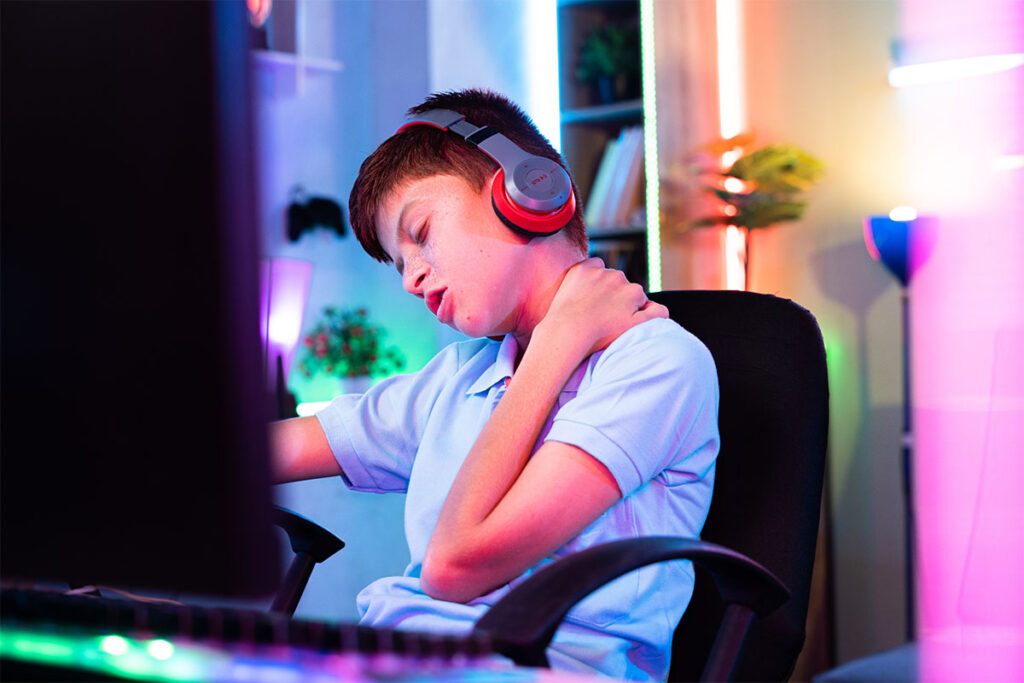For many teens, video games are more than just entertainment—they’re a way to unwind, stay connected with friends, and even express creativity. But for some adolescents, gaming can become more than a hobby. When screen time turns into a constant need and begins to interfere with daily life, it may signal a deeper issue: video game addiction.
We help families understand and address problematic gaming habits. Our specialized process addiction treatment supports teens in regaining control, improving mental well-being, and building healthier routines.
Why video games can become addictive
Video games are designed to be engaging—and often, addictive. Game developers use reward systems, achievements, bright visuals, and fast-paced challenges to keep players immersed. For teens, whose brains are still developing, the instant gratification and constant stimulation can be especially hard to resist.
Adolescents are also in a stage of life where they’re still building emotional regulation skills. Games can become an easy escape from difficult emotions or stress, offering a sense of achievement, social interaction, or control they might not feel elsewhere.
This can come at a cost. As gaming takes up more time, it may start to replace sleep, physical activity, academics, family relationships, and other important parts of daily life. In some cases, over-gaming can also worsen or be linked to anxiety and depression.
Recognizing the signs of video game addiction
It can be difficult to tell when a teen’s love for gaming becomes unhealthy. Here are common red flags to watch for:
- Preoccupation with gaming: Constantly talking or thinking about games, even when not playing
- Neglecting responsibilities: Ignoring school, chores, or family time
- Loss of interest: Abandoning other hobbies or friendships
- Mood swings: Irritability, anxiety, or anger when not allowed to game
- Sleep problems: Staying up late gaming, then struggling to wake up
- Secrecy or dishonesty: Hiding how much time they’re spending gaming
- Escaping stress: Using games to avoid emotions, school pressure, or social anxiety
No single behavior guarantees addiction, but patterns like these can point to a deeper issue.
The ADHD and Video Game Addiction Link
Teens with attention-deficit/hyperactivity disorder (ADHD) are at greater risk for video game addiction. Research shows that individuals with ADHD are more likely to exhibit problematic gaming behaviors than their neurotypical peers.
Why? Video games offer immediate rewards, rapid feedback, and a structured environment—all of which appeal to the ADHD brain. These teens often struggle with impulse control, time management, and focus, making it harder to stop playing once they start.
In fact, a 2021 study found that adolescents with ADHD symptoms were twice as likely to experience symptoms of Internet Gaming Disorder (IGD), a condition recognized by the World Health Organization.
At MCAW, we understand the unique challenges faced by teens with ADHD. Our treatment plans take into account attention and focus issues, helping these teens build awareness, self-regulation skills, and healthier coping mechanisms.
How video game addiction affects teen mental health
When video games become the center of a teen’s world, the effects go far beyond screen time. Some teens may:
- Fall behind in school
- Struggle with low self-esteem
- Experience worsening depression or anxiety
- Feel isolated from family or peers
- Become less physically active and more fatigued
Mental and emotional well-being are closely tied to daily habits. Unchecked gaming can become a cycle that damages confidence, limits real-world experiences, and deepens emotional struggles.
What parents can do
If you’re worried your teen is addicted to video games, the first step is open, compassionate communication. Here are some steps to guide your approach:
- Start the conversation: Ask your teen how they feel about gaming and whether they think it’s affecting their life. Avoid judgment—focus on listening.
- Set boundaries together: Work as a team to set limits on screen time that feel fair and achievable.
- Support a balanced lifestyle: Encourage non-digital activities like sports, art, or in-person time with friends.
- Lead by example: Model healthy screen habits at home.
- Seek help when needed: If gaming is significantly impacting your teen’s mood, schoolwork, or relationships, it may be time to reach out to a professional.
MCAW can help
Video game addiction can feel isolating for teens and overwhelming for parents—but you’re not alone. At MCAW, we specialize in treating adolescents struggling with process addictions like gaming. Our programs are tailored to meet each teen’s unique needs, including those with ADHD or co-occurring mental health conditions.
Through individual counseling, group therapy, and family support, we help teens build a healthy relationship with technology—and with themselves.
If you’re concerned about your teen’s gaming habits, reach out today. Our team is here to answer your questions and help you explore treatment options. Call 855.940.6229 or contact us online. Let’s work together to create a healthier, more balanced future for your teen.


